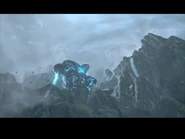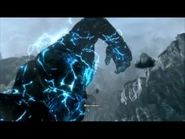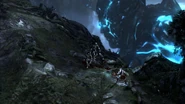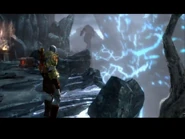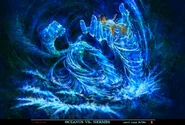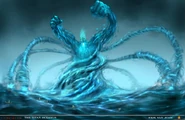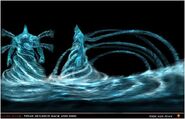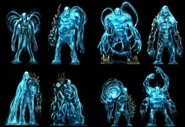Tags: Visual edit apiedit |
|||
| (13 intermediate revisions by 10 users not shown) | |||
| Line 1: | Line 1: | ||
{{Infobox gods |
{{Infobox gods |
||
| ⚫ | |||
| − | || |
||
| ⚫ | |||
|gender = Male |
|gender = Male |
||
| − | | |
+ | |birthplace = [[Island of Creation]] |
| ⚫ | |||
| ⚫ | |||
| − | |family = |
+ | |family = *[[Gaia]] (Mother) † |
| − | *[[ |
+ | *[[Ouranos]] (Father) † |
| − | *[[Ouranos]] (Father) |
||
*[[Pontus]] (Brother) |
*[[Pontus]] (Brother) |
||
*[[Cronos]] (Brother) † |
*[[Cronos]] (Brother) † |
||
| Line 14: | Line 12: | ||
*[[Aegaeon]] (Brother) † |
*[[Aegaeon]] (Brother) † |
||
*Cottus (Brother) |
*Cottus (Brother) |
||
| − | *Thoosa ( |
+ | *Thoosa (Daughter) |
*Tethys (Sister/Wife) |
*Tethys (Sister/Wife) |
||
*[[Amphitrite]] (Daughter) |
*[[Amphitrite]] (Daughter) |
||
| + | *Oceanids (Daughters) |
||
| + | *Potamoi (Sons) |
||
*[[Triton]] (Grandson) |
*[[Triton]] (Grandson) |
||
| − | *[[Polyphemus]] (Grandson) |
+ | *[[Polyphemus]] (Grandson) † |
| + | *[[Athena]] (Granddaughter) † |
||
*[[Poseidon]] (Nephew/Son-in Law) † |
*[[Poseidon]] (Nephew/Son-in Law) † |
||
*[[Zeus]] (Nephew) † |
*[[Zeus]] (Nephew) † |
||
| Line 26: | Line 27: | ||
*[[Hera]] (Niece) † |
*[[Hera]] (Niece) † |
||
*[[Demeter]] (Niece) |
*[[Demeter]] (Niece) |
||
| − | *Hestia (Niece) |
+ | *[[Hestia]] (Niece) |
*Selene (Niece) |
*Selene (Niece) |
||
| ⚫ | |||
| ⚫ | |||
| − | | |
+ | |location = [[Tartarus]] |
|voice actor = None |
|voice actor = None |
||
|appears in = [[God of War III]] |
|appears in = [[God of War III]] |
||
| ⚫ | |||
| − | }} |
||
| − | |||
| ⚫ | |||
==Greek Mythology== |
==Greek Mythology== |
||
| − | In [[Greek]] myth, '''Oceanus''' was one of the [[Titans]]. He was the husband and brother of Tethys and is well known in mythology as the great river that girdles the world. Not much is known about his role in the Great War. It is said that he did not participate in the war and left his Titan brothers. Also, Oceanus was also against the decision to overthrow Uranus. |
+ | In [[Greek]] myth, '''Oceanus''' was one of the [[Titans]]. He was the husband and brother of Tethys and is well known in mythology as the great river that girdles the world. Not much is known about his role in the Great War. It is said that he did not participate in the war and left his Titan brothers. Also, Oceanus was also against the decision to overthrow Uranus. Thus, he avoided being imprisoned in Tartarus. |
His only appearance of note in the Greek Myths is when he stirs up the ocean to test the hero [[Hercules]] on his way to fetch the Cattle of Geryon. Hercules managed to frighten Oceanus into calming the sea by threatening him with his bow. Also, it is said that Oceanus and Tethys raised the goddess Hera after Cronos threw her up. With Tethys, Oceanus had the 50 (or 3,000) Oceanids and the 3,000 rivers of the world. |
His only appearance of note in the Greek Myths is when he stirs up the ocean to test the hero [[Hercules]] on his way to fetch the Cattle of Geryon. Hercules managed to frighten Oceanus into calming the sea by threatening him with his bow. Also, it is said that Oceanus and Tethys raised the goddess Hera after Cronos threw her up. With Tethys, Oceanus had the 50 (or 3,000) Oceanids and the 3,000 rivers of the world. |
||
| Line 46: | Line 45: | ||
Oceanus was originally intended to be in [[God of War II]], portrayed as a massive and entirely water-based creature, quite different from his much more solid brethren, but was cut from the game. |
Oceanus was originally intended to be in [[God of War II]], portrayed as a massive and entirely water-based creature, quite different from his much more solid brethren, but was cut from the game. |
||
| + | Oceanus makes an indirect appearance in the God of War II novelization, where Poseidon mentions he is rising again and defying his rule over the oceans the closer Kratos gets to reaching the Sisters of the Fate. Zeus, in response to this,claims that Oceanus was the least of the Titans, to which Poseidon stated Oceanus and his children were fierce enough to require the water of all the seas and lakes in the world to beat. |
||
===God of War III=== |
===God of War III=== |
||
He appears in God of War III as the Titan of Water and Lightning. He possesses the same physical body of the other Titans, with an electric current running though most of it that does massive damage to the surrounding mountains. He is seen being pulled off Mount Olympus by [[Hades]] who then jumps down after him, though some believe that Oceanus in fact pulled Hades down with him. Many assumed that he died during that fall. |
He appears in God of War III as the Titan of Water and Lightning. He possesses the same physical body of the other Titans, with an electric current running though most of it that does massive damage to the surrounding mountains. He is seen being pulled off Mount Olympus by [[Hades]] who then jumps down after him, though some believe that Oceanus in fact pulled Hades down with him. Many assumed that he died during that fall. |
||
| Line 73: | Line 73: | ||
*[[Titans]] |
*[[Titans]] |
||
| + | [[de:Okeanos]] |
||
[[de:Okeanos]] |
[[de:Okeanos]] |
||
[[Category:Characters]] |
[[Category:Characters]] |
||
| Line 79: | Line 80: | ||
[[Category:God of War III]] |
[[Category:God of War III]] |
||
[[Category:Allies]] |
[[Category:Allies]] |
||
| − | [[Category:God of War:Saga Collection]] |
+ | [[Category:God of War: Saga Collection]] |
[[Category:God of War Series]] |
[[Category:God of War Series]] |
||
| + | [[Category:Deceased]] |
||
| + | [[Category:Greek Mythology]] |
||
Revision as of 19:25, 6 August 2019
Template:Infobox godsOceanus, known as the great river girdling the world, was a God of War II character ultimately cut from its final version, before appearing in God of War III during the siege of Mount Olympus.
Greek Mythology
In Greek myth, Oceanus was one of the Titans. He was the husband and brother of Tethys and is well known in mythology as the great river that girdles the world. Not much is known about his role in the Great War. It is said that he did not participate in the war and left his Titan brothers. Also, Oceanus was also against the decision to overthrow Uranus. Thus, he avoided being imprisoned in Tartarus.
His only appearance of note in the Greek Myths is when he stirs up the ocean to test the hero Hercules on his way to fetch the Cattle of Geryon. Hercules managed to frighten Oceanus into calming the sea by threatening him with his bow. Also, it is said that Oceanus and Tethys raised the goddess Hera after Cronos threw her up. With Tethys, Oceanus had the 50 (or 3,000) Oceanids and the 3,000 rivers of the world.
In the God of War Series
God of War II
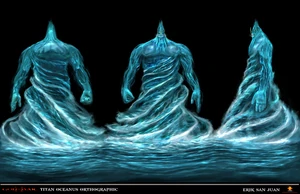
One of Oceanus' God of War II concept arts.
Oceanus was originally intended to be in God of War II, portrayed as a massive and entirely water-based creature, quite different from his much more solid brethren, but was cut from the game.
Oceanus makes an indirect appearance in the God of War II novelization, where Poseidon mentions he is rising again and defying his rule over the oceans the closer Kratos gets to reaching the Sisters of the Fate. Zeus, in response to this,claims that Oceanus was the least of the Titans, to which Poseidon stated Oceanus and his children were fierce enough to require the water of all the seas and lakes in the world to beat.
God of War III
He appears in God of War III as the Titan of Water and Lightning. He possesses the same physical body of the other Titans, with an electric current running though most of it that does massive damage to the surrounding mountains. He is seen being pulled off Mount Olympus by Hades who then jumps down after him, though some believe that Oceanus in fact pulled Hades down with him. Many assumed that he died during that fall.
His final fate is unknown, but as Gaia is the (presumed) final Titan by the end of the game (with the exception of Atlas, Rhea, and maybe Typhon) it is assumed he died during the climb up on Olympus. His weapons were water and his serpent.
Trivia
- Though the concept of Oceanus as a giant water titan would appear abandoned, the design was recycled for Poseidon, who bore a very similar watery form at the beginning of God of War III.
- The blue electrical currents from Oceanus are also very similar to Poseidon's ones, which can also be seen in God of War's magic Poseidon's Rage. Both seem to represent the power of the seas.
- Oceanus and Perses have a similar look, being both Titans with a black skin. The only differences are the lines over their body; Oceanus' are blue and Perses' are red, the electricity around Oceanus which Perses lacks and the volcano on the latter's back.
- In David Jaffe's idea of God of War III, Oceanus, in his water form, should kill Hermes.

